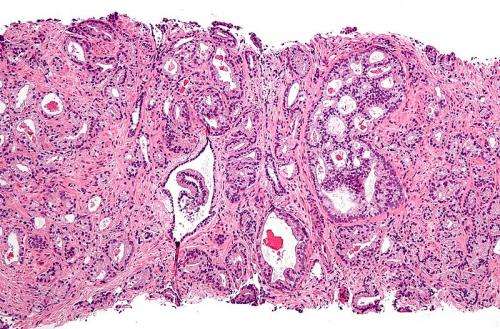Unfruitful: Eating more produce will not cure, stop prostate cancer

National guidelines recommend that men with prostate cancer eat a vegetable-rich diet, suggesting it might decrease cancer progression and death. But in a Phase III randomized clinical trial, patients with prostate cancer assigned to eat seven or more servings of vegetables and fruits daily saw no extra protection from the increased consumption of micronutrients.
"These data indicate that, despite prevailing scientific and public opinion, eating more vegetables will not alter the course of prostate cancer. It will not, to the best of our knowledge, suppress or cure it," said J. Kellogg Parsons, MD, University of California San Diego School of Medicine and Moores Cancer Center professor of urology and study lead investigator. "However, while eating a healthy diet rich in fruits and vegetables and getting more exercise may not cure cancer, it may keep the body stronger and healthier, which may help patients tolerate cancer treatments."
The Men's Eating and Living (MEAL) study, published January 14, 2020 in the Journal of the American Medical Association and led by UC San Diego Moores Cancer Center and Roswell Park Comprehensive Cancer Center investigators, enrolled 478 men aged 50 to 80 years at 91 sites in the United States. The patients had been diagnosed with early-stage prostate adenocarcinoma and enrolled in an active surveillance program in which patients defer immediate treatment until the disease advances.
Patients were randomized to a control group that received written information about diet and prostate cancer or to a telephone counseling behavioral intervention program that encouraged participants to eat foods high in carotenoids, such as leafy greens, carrots and tomatoes, and cruciferous vegetables such as broccoli and cabbage. Both groups were monitored for two years.
"Patients assigned to the intervention increased their intake of fruits and vegetables to a statistically significant degree, and significantly more than control patients did. These findings were supported by significant changes in the blood carotenoid levels of patients. Nonetheless, these data fail to support prevailing assertions in clinical guidelines and the popular media that diets high in micronutrient-rich vegetables improve cancer-specific outcomes among prostate cancer survivors," said James Marshall, Ph.D., Distinguished Professor with the Department of Cancer Prevention and Population Sciences at Roswell Park, co-senior author on the study with John Pierce, Ph.D., Professor Emeritus of Cancer Prevention at UC San Diego School of Medicine.
The study is the first randomized clinical trial to test the effect of dietary intervention on prostate cancer. It was conceived based on preliminary scientific data and on inquiries from patients who wondered if a change in diet would influence their diagnosis or treatment, said Parsons, a urologic oncologist at UC San Diego Health, San Diego's only National Cancer Institute-Designated Comprehensive Cancer Center.
"The most common question I receive from men on active surveillance is, 'Can I decrease the chances that I will need treatment for prostate cancer by changing my diet?' We now have good evidence that a diet rich in fruits and vegetables and light on red meat is not likely to impact need for treatment," said co-author James Mohler, MD, professor of oncology with Roswell Park's department of urology. "But this study does not provide justification for eating anything you want, either. The overall health benefits of a diet that's relatively low in fat and rich in fruits, vegetables and healthy grains are well-established."
The impact of nutrition on diseases is an ongoing conversation among researchers and clinicians. Scientific studies have identified a strong role for changing diet to improve outcomes in diabetes and cardiovascular disease, but not in cancer, said Parsons.
Although the MEAL study revealed no positive impact on prostate cancer, it did demonstrate that behavioral modification can lead patients to make healthier food choices, said Parsons.
"We designed a simple and inexpensive program that proved we could change people's diets for the better. We hoped that through nutrition we could alter disease outcomes and then use those data to build a network of diet counselors to help men with prostate cancer eat more vegetables," said Parsons. "It's still an endeavor worth considering, possibly in patients with advanced prostate cancer."
More information: J. Kellogg Parsons et al. Effect of a Behavioral Intervention to Increase Vegetable Consumption on Cancer Progression Among Men With Early-Stage Prostate Cancer: The MEAL Randomized Clinical Trial JAMA. 2020;323(2):140-148. DOI: 10.1001/jama.2019.20207



















